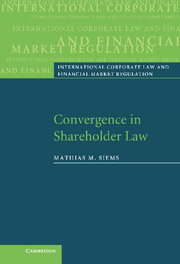Book contents
- Frontmatter
- Contents
- Preface and acknowledgments
- List of abbreviations
- Table of cases
- Table of legislation
- Introduction
- PART I The object and course of the investigation
- PART II The status quo of convergence
- PART III Developmental trends and patterns
- 7 Bases
- 8 Convergence through congruence
- 9 Convergence through pressure
- 10 Future convergences in shareholder law
- 11 Conclusions to Part III
- PART IV Conclusion
- References
- Index
9 - Convergence through pressure
Published online by Cambridge University Press: 15 December 2009
- Frontmatter
- Contents
- Preface and acknowledgments
- List of abbreviations
- Table of cases
- Table of legislation
- Introduction
- PART I The object and course of the investigation
- PART II The status quo of convergence
- PART III Developmental trends and patterns
- 7 Bases
- 8 Convergence through congruence
- 9 Convergence through pressure
- 10 Future convergences in shareholder law
- 11 Conclusions to Part III
- PART IV Conclusion
- References
- Index
Summary
It follows from the findings of the social sciences that pressure from interest groups and other social forces can decisively influence the direction of the law. In the present case, it is accordingly initially conceivable to study the possibilities of influence by company founders, management, shareholders, other stakeholders, foreign countries and international organizations (sections I to V below). Finally, it will be asked what pressure is most likely to be reflected in legislation on shareholder law and whether this will lead to convergence (section VI below).
Pressure from company founders
Founders may exercise pressure on legislation on the one hand through regulatory competition. What this means is that someone will found a company in a particular legal system only when the law is positive for him, thus influencing legal developments (subsection 1 below). On the other hand, as with other groups, the possibility exists of asserting their interests with legislators by lobbying (subsection 2 below).
Regulatory competition
The phenomenon of regulatory competition for company founders has been well discussed, particularly in the US. The critical position assumes that, in conditions of competition, legislators are exposed to heavy pressure from company founders and management. There is therefore a threat of a ‘race of laxity’ or a ‘race to the bottom’, since the law is deregulated at the expense of other groups like shareholders, creditors or employees. By contrast, the counter-view stresses that there can be a ‘race to the top’, a spiral towards optimal protection.
- Type
- Chapter
- Information
- Convergence in Shareholder Law , pp. 297 - 335Publisher: Cambridge University PressPrint publication year: 2007



